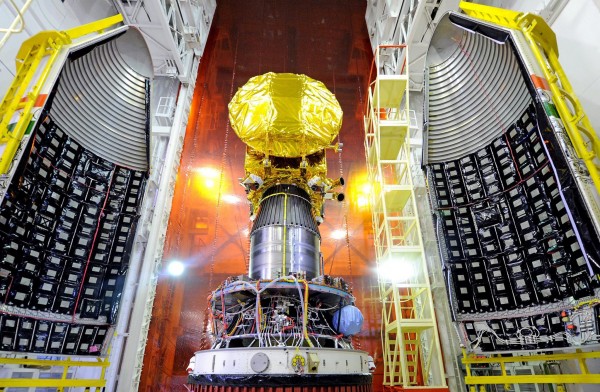Read more of this story at Slashdot.

The Mangalyaan Mars Orbiter Spacecraft mounted in a rocket at the Satish Dhawan Space Center in India. Photo: Indian Space Research Organization, via NYT.
Saritha Rai, reporting for the New York Times on India’s recent launch of a spacecraft to Mars: "It is the $75 million mission’s thrifty approach to time, money and materials that is getting attention. Just days after the launch of India’s Mangalyaan satellite, NASA sent off its own Mars mission, five years in the making, named Maven. Its cost: $671 million. The budget of India’s Mars mission, by contrast, was just three-quarters of the $100 million that Hollywood spent on last year’s space-based hit, Gravity.” [NYTimes.com]![]()
4,096 x 2,160 IPS panel with a 19:10 ratio
"Interestingly, the new offering conforms to the 4K format recorded by RED's Epic and Scarlet cameras and also packs a Thunderbolt 2 port with 20Gbps throughput. "
source : engadget

With Apple making its iWork for iOS suite free with the purchase of a new iOS device, the mobile office wars are heating up as more and more people turn to their phones to conduct business. Not to be outdone, Google announced today that it is making its previously paid-for Quickoffice iOS app free for everyone. Announcing the move in a blog post, Google said:
Everyone likes free stuff, which is why starting today we're making Quickoffice available for free, for everyone. With Quickoffice, you can edit Microsoft(R) Office documents across your devices, giving you the freedom to work with anyone no matter what hardware or software they're using. Quickoffice also integrates seamlessly with Google Drive storage so you can safely access your files from anywhere. And while the easiest thing to do is simply convert your old files to Google Docs, Sheets and Slides, Quickoffice gives you another way to work with people who haven't gone Google yet.
Google is also giving users who download the Quickoffice app and sign into their Google Accounts from it by September 26, 2013 an additional 10 GB of storage space on their Google Drives for the next two years.
Google makes Quickoffice for iOS free and universal originally appeared on TUAW - The Unofficial Apple Weblog on Thu, 19 Sep 2013 18:45:00 EST. Please see our terms for use of feeds.
I got tired of people savvying me about the revelations of NSA surveillance and asking why anyone would care about secret, intrusive spying, so I wrote a new Guardian column about it, "The NSA's Prism: why we should care."
We're bad at privacy because the consequences of privacy disclosures are separated by a lot of time and space from the disclosures themselves. It's like trying to get good at cricket by swinging the bat, closing your eyes before you see where the ball is headed, and then being told, months later, somewhere else, where the ball went. So of course we're bad at privacy: almost all our privacy disclosures do no harm, and some of them cause grotesque harm, but when this happens, it happens so far away from the disclosure that we can't learn from it.
You should care about privacy because privacy isn't secrecy. I know what you do in the toilet, but that doesn't mean you don't want to close the door when you go in the stall.
You should care about privacy because if the data says you've done something wrong, then the person reading the data will interpret everything else you do through that light. Naked Citizens, a short, free documentary, documents several horrifying cases of police being told by computers that someone might be up to something suspicious, and thereafter interpreting everything they learn about that suspect as evidence of wrongdoing. For example, when a computer programmer named David Mery entered a tube station wearing a jacket in warm weather, an algorithm monitoring the CCTV brought him to the attention of a human operator as someone suspicious. When Mery let a train go by without boarding, the operator decided it was alarming behaviour. The police arrested him, searched him, asked him to explain every scrap of paper in his flat. A doodle consisting of random scribbles was characterised as a map of the tube station. Though he was never convicted of a crime, Mery is still on file as a potential terrorist eight years later, and can't get a visa to travel abroad. Once a computer ascribes suspiciousness to someone, everything else in that person's life becomes sinister and inexplicable.
The NSA's Prism: why we should care ![]()






